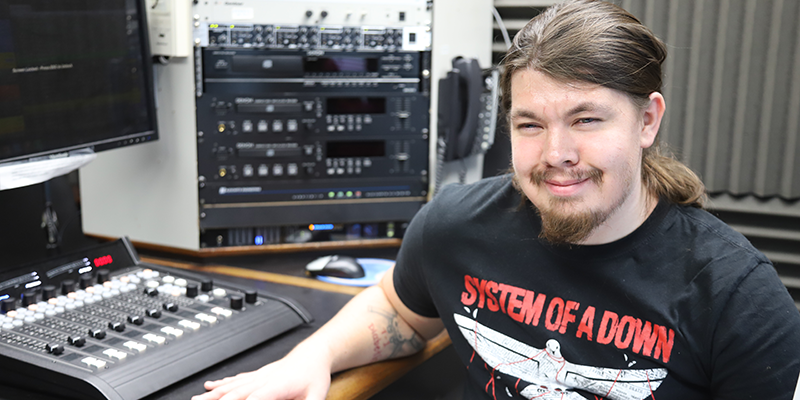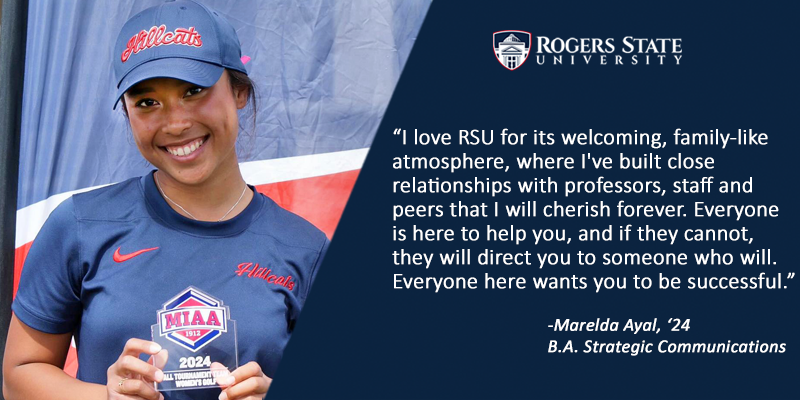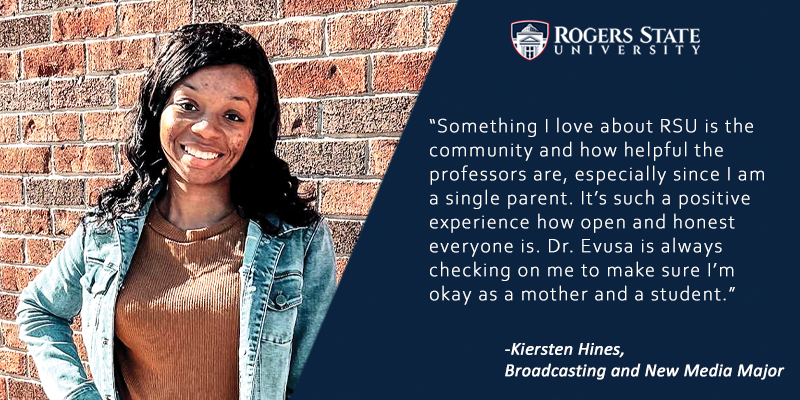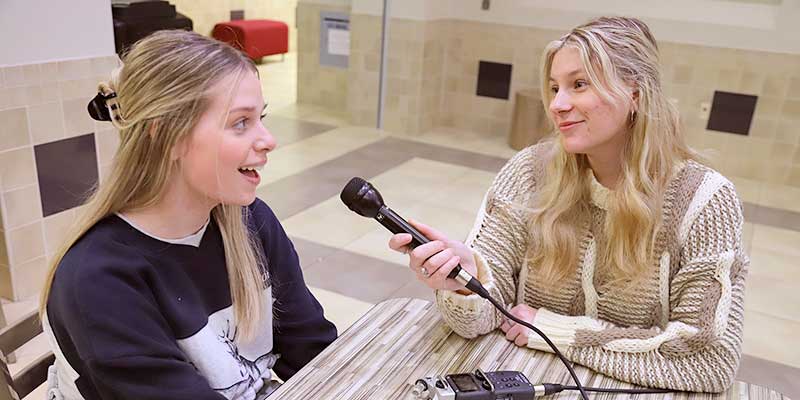Master Oral and Written Communication Skills. Shine Behind the Scenes as a Media Producer. Help Companies Grow Through Marketing.
With a degree from RSU’s Department of Communications, it’s all possible.
There are few disciplines as vast as communications. From broadcasting and public relations to marketing and live performance, RSU’s Department of Communications prepares you for a huge variety of career paths doing what you love while serving your community.
Communications majors at RSU enjoy access to cutting-edge equipment and facilities to introduce them to the tools used by professionals every day.
As a Hillcat in the Department of Communications, you’ll become a member of an ever-growing family of peers, faculty, and alumni who are dedicated to achieving their dreams and helping others achieve theirs.
Department of Communications Features
RSU’s Department of Communications offers so many unique benefits for Communications majors: from the expertise of our faculty to our commitment to experiential learning, you’ll quickly see what sets us apart from other communications programs around the country. When you join the Department of Communications, you’ll enjoy:
- Individual academic attention. Most theory courses are capped at 25 students, and production courses are capped at 15. This means that you will have plenty of chances to meet and work one-on-one with faculty mentors who will know you by name.
- Real-world work experiences. Communications majors work with real clients in public relations strategies, internships, and corporate media production, as well as during their capstone project. Top students can even work part-time in radio operations, television, and theatre production. This hands-on learning means that you’ll graduate with a robust resume and meaningful stories to tell during job interviews.
- Experienced faulty. Our faculty members bring their many years of professional experiences into the classroom to prepare you to flourish in your chosen field. Our broadcast faculty have 30 years of experience in the commercial television industry!
Department of Communications Majors and Minors
RSU’s Department of Communications offers three specializations in our Bachelor of Arts in Communication program to help you tailor your education journey to align with your career goals.
Pursue your passions in:
Bachelor of Arts in Communications: Broadcasting and New Media
From television and radio news to sitcoms and special events, skilled broadcasting professionals are always in high demand. Communications majors focusing on broadcasting and new media can develop their own projects, including news, feature stories, and even high-definition digital productions. Learn more about Broadcasting and New Media.
Bachelor of Arts in Communications: Communication Arts
If you see yourself on the other side of the production booth, our concentration in communication arts draws on a co-curricular program in theatre to provide Communications majors with courses in acting, script writing, voice, and articulation. Learn more about Communication Arts.
Bachelor of Arts in Communications: Strategic Communications
Communications majors interested in careers in marketing, advertising, public relations, management, and sales will thrive in our Strategic Communication concentration. Our engaging courses will prepare you for the responsibility of communicating on behalf of organizations both big and small — including major companies, nonprofits, and government agencies. Learn more about Strategic Communications.
Minors
The minors available through the Department of Communications are an ideal complement to almost every major, thanks to their foundation in oral and written communication skills — skills that apply to every industry. You will get the same choice in concentration areas: Broadcasting and New Media, Communication Arts, and Strategic Communication. Explore Minors in Communications.
Why Choose RSU’s Department of Communications?
Among the many things that set us apart from other universities and Communications programs around the nation are our sophisticated facilities and equipment. RSU’s broadcast studios are superior for a regional university. RSU Radio (KRSC-FM) is a full-power radio station that includes six audio studios, a state-of-the-art transmitter, worldwide streaming, and a brand-new music-tracking system. Communications majors enjoy exclusive access to these tools to prepare for a career in broadcasting and production.
RSU also boasts a 100-seat performance studio that includes full lighting and sound, a switcher and three-camera operation, and a fiberoptic connection to RSU Public TV (KRSU-TV) — the state’s only full-power television station licensed to a public university. RSU Public TV produces local special interest programming and documentary features.
Communication majors at RSU can also join the Student Broadcasting Association (SBA), which works closely with the Oklahoma Broadcasting Education Association (OBEA). This organization includes both comprehensive state universities and all regional institutions. Join the SBA and prepare to become part of the next generation of broadcast professionals.
What Our Alumni Have to Say About RSU’s Department of Communications
“A Communications degree has a lot of career options. One of the strengths of the Communications program at RSU is the technology that we have access to. The experience you get working with software, cameras, editing bays, and production studios helps enrich the educational process, and you can apply those skills to real-life situations. Everything you learn in the program will help you excel, no matter where you go. If you’re not sure what degree you want, Communications is a great place to start.” – Mathew Rahn, B.A. in Communications
What Can You Do With a Degree From the Department of Communications?
Because communications is such a vast field, there’s an incredibly diverse list of careers and roles you’ll be qualified for as a Communications major at RSU. In addition to the specialized training Communications majors receive in their concentrations, you’ll also develop and strengthen essential communications skills that can help you stand out in any market or field.
Here are just some of the impactful careers that Communications majors at RSU go on to:
- News anchor
- Broadcaster
- College recruiter
- Communication consultant
- Community relations director
- Government lobbyist
- Governmental press secretary
- Theater manager
- Human resources manager
- Journalist/reporter
- Public speaker
- Radio talk show host
- Speech writer
- Market researcher
- Marketing specialist
Financial Aid for the Department of Communications
We at Rogers State University pride ourselves on the affordability and accessibility of our programs. In addition to low-cost tuition, we also offer financial aid and scholarship opportunities to help you graduate free of debt.
To learn more about attending RSU, check out the cost of attendance and financial aid resources.
Begin Your Hillcat Journey in the Department of Communications
Are you ready to become a Hillcat and begin building the foundation for an exciting career doing what you’re passionate about? Request information to learn what sets RSU apart from other universities in the state. Visit campus to see just how beautiful it is. Apply today!
Dr. Holly Kruse, Associate Professor
“Students are able to get a really personal experience in the Communications department. They have several opportunities to learn both theory and practical application in their classes and through internships at a variety of organizations. The faculty are available and committed to student success, both because of the size of the department and the nature of the people in it. I get good feedback from students after they’ve graduated that what they learned in the Communications department helped prepare them for their real-world experience.”








